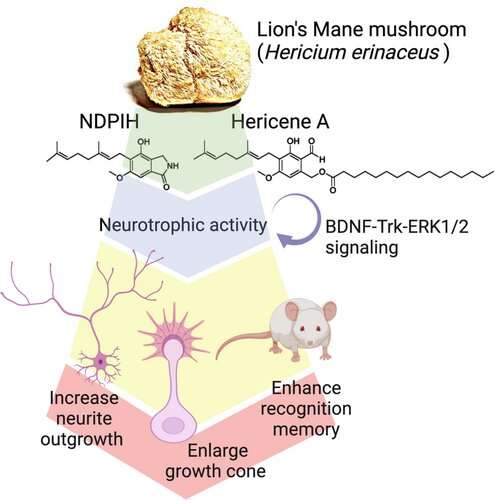Recent research indicates that Lion’s Mane Mushroom has the ability to improve brain cell growth. Here’s what we know.
A team of researchers at The University of Queensland have found a compound in a type of edible mushroom, Hericium erinaceus, that can enhance the memory and promote nerve growth.
Hericium erinaceus, commonly known as ‘Lion’s Mane Mushroom’, is a type of edible fungus that thrives on the trunks of dead hardwood trees, such as oak trees. This mushroom is utilised in various cuisines and has a lengthy history of being used for its medicinal attributes in East Asia, North America and Europe.
The study was published in the Journal of Neurochemistry. According to Professor Frederic Meunier of the Queensland Brain Institute, the research has identified new active compounds in this type of mushroom.
“Extracts from these so-called ‘Lion’s Mane’ mushrooms have been used in traditional medicine in Asian countries for centuries, but we wanted to scientifically determine their potential effect on brain cells,” Professor Meunier told Medical Express.
Through pre-clinical testing, it has been discovered that the lion’s mane mushroom can have a notable effect on both the growth of brain cells and the enhancement of memory.
In laboratory experiments, scientists evaluated the impact of compounds extracted from Hericium erinaceus on cultured brain cells, and to their surprise, they observed that the active compounds can stimulate the growth of neuron projections, allowing them to extend and connect with other neurons.

“Using super-resolution microscopy, we found the mushroom extract and its active components largely increase the size of growth cones, which are particularly important for brain cells to sense their environment and establish new connections with other neurons in the brain,” the expert explained.
As a person ages, the brain’s capacity to develop and establish fresh connections diminishes, resulting in a decline in mental performance. Nevertheless, research has discovered that the Lion’s Mane Mushroom possesses components that can promote the growth of brain cells.
Monique Richar, a nutritionist and registered dietician from Johnson City, Tennessee, and a spokesperson for the Academy of Nutrition and Dietetics, told Longevity Live that Lion’s Mane has been associated with the activation of two essential proteins: Nerve Growth Factor (NGF) and Brain-Derived Neurotrophic Factor (BDNF).
The Basal Forebrain, responsible for producing acetylcholine, one of the brain’s most prevalent neurotransmitters for communication, relies on Nerve Growth Factor (NGF) for proper function.
Meanwhile, Brain-Derived Neurotrophic Factor (BDNF) plays a crucial role in promoting the growth, repair and normal functioning of neurons.
The Lion’s Mane Mushroom contains hericenones and erinacines, chemicals that encourage the development of these brain cells. This suggests that the mushroom can help safeguard the brain against neurodegenerative illnesses.
Dr. Ramon Martinez-Marmol, a co-author from UQ, stated that the discovery could be used to treat and prevent neurodegenerative cognitive disorders like Alzheimer’s disease.
“Our idea was to identify bioactive compounds from natural sources that could reach the brain and regulate the growth of neurons, resulting in improved memory formation,” Dr. Martinez-Marmol said.
As per the Alzheimer’s Disease Association, approximately 6.2 million individuals have been impacted by Alzheimer’s disease. A study conducted in 2020 found that individuals over 50 years of age who exhibited mild symptoms of Alzheimer’s disease experienced a notable improvement in their cognitive abilities after consuming three 350 mg capsules of Lion’s Mane Mushroom daily for 49 weeks.
Another study involving 77 individuals who consumed three 400 mg capsules of the mushroom daily for eight weeks revealed that it helped alleviate symptoms of depression, anxiety and sleep disorders
Traditional Chinese medicine has long used the properties of Lion’s Mane Mushrooms to treat illnesses and maintain health, according to Dr. Dae Hee Lee from CNGBio Co, who supported and collaborated on the research project.
“This important research is unraveling the molecular mechanism of Lion’s Mane Mushroom compounds and their effects on brain function, particularly memory,” Dr. Lee said.







